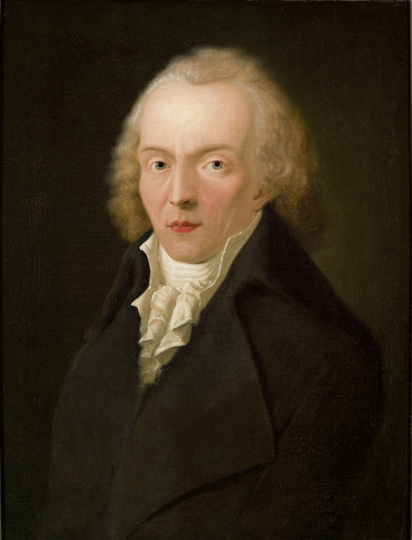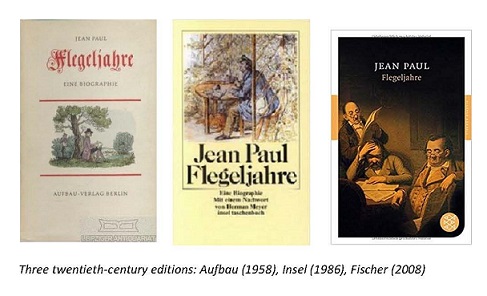Dr Seán Williams discusses Jean Paul Richter’s ‘Flegeljahre’ and its place in his thoughts on luxury, and its relevance to today
Life in lockdown is, by definition, domestic. Of course it’s frustrating, but because I’m normally not the organised sort in sourcing home supplies, I’m enjoying the novel challenge of a weekly shop. (Though I deplore stockpiling, I fear I’ve contributed to the problem with my own false calculations about how much I actually eat in a week. Perhaps I’ve just lost my appetite, with Armageddon going on outside.) In any case, we can seek relief from the coronavirus chaos in reading. And being a lover of the late eighteenth and early nineteenth centuries, I’m in luck: authors of my preferred period are all online; their works are free to download. So over the past fortnight, I’ve spent some of my time at home with Jean Paul Richter.

Jean Paul and I have a history. I spent my doctoral years reading him with an eye to literary and intellectual history around 1800, and paratexts in particular. His prefaces about prefaces were the subject of my first book. Now, I’m just as interested in, say, the ‘Inn of the Inn’ — or ‘Wirtshaus zum Wirtshaus’ — from his unfinished novel Flegeljahre (1804-05). In other words, as my research has moved more into cultural history, and specifically subjects such as emergent consumer capitalism and the new social status of professions like the hairdresser, my starting point is a familiar one: Jean Paul’s fiction. He incessantly alludes to contemporary everyday, and especially domestic life, doing so with self-reflexive turns typical of his time (hence the ‘Inn of the Inn’). Jean Paul’s writing is as encyclopaedic as it is eccentric. He opens Flegeljahre by speaking to literary, intellectual, cultural, and also political history that sits on the threshold from the eighteenth into the nineteenth centuries. To quote a mid-nineteenth century English translation:
‘I shall touch upon vaccination, the book and wool trade, the monthly periodicals, Shelling’s double system of magnetism and metaphors, the new territorial boundary marks, with the illegal duties; also, field mice and caterpillars, and Buonaparte. These last I shall touch only cursorily, and as becomes a poet.’
[‘Ich berühre darin die Vakzine – den Buch- und Wollenhandel – die Monatsschriftsteller – Schellings magnetische Metapher oder Doppelsystem – die neuen Territorialpfähle – die Schwänzelpfennige – die Feldmäuse samt den Fichtenraupen – und Bonaparten, das berühr’ ich, freilich flüchtig als Poet.‘]
Plenty to occupy us, then. Yet what makes Flegeljahre so fascinating is that there is the sense of society around 1800 encountering an uneasy transition. The optimism of the Enlightenment has faded; faith in an aesthetic education — or the German concept of Bildung, an intellectual, spiritual development of the self — as the path towards collective progress is obviously misplaced. But Jean Paul does not abandon the cultural ideal of Bildung altogether. The protagonist twins from the Flegeljahre, Walt and Vult, are writers themselves, though neither of them is a model character. Vult is a picaresque, almost baroque travelling flautist who flits in and out of the fiction at whim. Walt is committed to his home place, and in that sense more grounded than his brother. But he’s far too much of a dreamer. He’s inspired by Wutz, the literary, rural, impoverished schoolmaster of an early idyll by Jean Paul: a figure who buys into the world of the mind despite, for someone of his situation, the unaffordability of books, such that that he writes the stories whose titles are listed in trade catalogues himself, just as he imagines them. If Wutz of 1793 can find contentment despite the constraints of contemporary German life, however, Walt’s escapism a decade later is repeatedly reeled back to reality with a thump (though he seems to withstand each knock with a naive, if charming smile). Walt’s idylls are all the more frustrated, therefore. Not least for this reason, Jean Paul’s Flegeljahre might appear appropriate reading at present — a very different age of frustrated domestic idylls.
The standard problem for middle class men of Jean Paul’s day, epitomised in Goethe’s character of Werther in the 1770s already, was that the late eighteenth century had unleashed the intellectual and artistic potential of German youth, only for it to be made impotent by philistine bureaucrats and capitalists, and by the old aristocratic order that in German territories was still in power into the nineteenth century. At least, that is how many authors perceived it, as they resisted a conservative straightjacket, but wanted to make a success of everyday life all the same. In Jean Paul’s works, there’s also a social consciousness at stake — not so much for the bonded peasants, to whom Voss and the rural Enlightenment gave a voice — but for the local squeezed middle, as it were. Jean Paul’s characters are usually born free, but just about manage to get by, not least materially. So it’s no surprise that luxury is used to describe social differences, by Jean Paul like his many contemporaries.

In Flegeljahre, it is the books in exquisite bindings, gilded ceilings, and other ostentatious objects that make a stranger of the local count to Walt. And when Walt is mistaken for someone else in being assigned guest lodgings, he is astounded by the ‘splendour of a splendorous (state) room’ (‘Prunk des Prunkzimmers’); the accommodation’s opulence includes hung paper instead of plastered wallpaper (‘die Papiertapeten statt des ihm gewöhnlichern Tapetenpapiers’), furniture such as commodes and many mirrors, and so on. Walt is used to village life; on arriving in town, he’s taken aback by the scene of urban life: golden carriages passing by, people wearing red cloaks, and hairdressers — the newfangled friseurs — apparently working every day of the week. This picture of society is set against the backdrop of emergent consumer capitalism, even in the German principalities. Around 1800 was a period of proto-industrialisation. And so at the end of the Flegeljahre, there is a hint of cultural nostalgia — for a supposedly easier age. One of the symbols of late eighteenth-century consumption was linen. As the narrator Jean Paul quips wistfully, were his time not the reign of Charles VII of France, in the fifteenth century, for then ‘in the whole land no one possessed a change of linen, except the King’s wife’ (‘es wäre jetzt wie unter Karl dem VII. von Frankreich, wo im ganzen Lande niemand zwei Hemden besaß als seine Gemahlin’).
Jean Paul’s nostalgia misread the past, but it was alive to the present. Indeed, throughout Europe at the turn of the nineteenth century, luxury was no light-hearted topic. Thinkers began to suggest that, far from leading to general prosperity, luxury was a pan-European problem that in fact could bring about poverty. The economically liberal doctrines of Adam Smith, heralded in the late eighteenth century, came in for special criticism at the beginning of the nineteenth. For Charles Hall, luxury was at fault because it robbed workers of valuable labour time, which they could otherwise and more usefully spend on their own subsistence. For Jean Paul, writing in an essay of 1808, luxury caused poverty because it wasted money. For him, the extreme differences between the material lives of the rich and the poor were a problem. After the French Revolution, then, not only poverty but equality was at issue — albeit not phrased so starkly in German territories. As part of the argument, Jean Paul opposed better and worse types of luxury with each other, though the good sort was in some senses still the lesser of two evils. In his 1808 essay, he contrasts a ‘furniture luxury’ (‘Möbeln-Luxus’) or even ‘class-conscious luxury’ (‘Standes-Luxus’) on the one hand, with a ‘people’s luxury’ (‘Volksluxus’) or ‘luxury of pleasure’ (‘Genussluxus’) on the other. In other words, while the higher social ranks are criticised as having an insatiable appetite for grandeur that craves foreign appreciation, the German ‘nation’ or people as a whole could be excused a self-regulating pleasure in luxuries that are akin to Sunday rest after a working week. Permissible luxury is metaphorically the light of the sun rather than its reflections in houses.
To return to my own readerly position, Jean Paul’s Flegeljahre and its place in his thought and literature on luxury appears relevant in a couple of ways. First, and more personally, I have spoken and written about luxury in the past year, and I teach a module on ‘luxury and liberty’. My own reflections on this topic began by reading Jean Paul. I am currently planning a colloquium on luxury around 1800 for spring 2021, which in the current pandemic and given talk of economic recession might appear decadent. But luxury is often a litmus test for the direction in which society will go. For example, when Swiss grand hotels suffered after the First World War, attempts to create hotspots of ‘affordable’ accommodation, and thereby populate deserted spas, came to nothing. Capitalism was rebuilt. For now, LVMH may have re-purposed their factories to produce hand sanitiser, and InterContinental hotels in London are housing the homeless. How these upmarket businesses will fare after the crisis will be indicative of socio-political undercurrents. If these few examples constitute a tangent about the future — how Jean Paulish of me to digress — let us think again about the homely here and now. To that end, Jean Paul’s typology of acceptable versus unacceptable luxury places a high social value on the artisans. The small pleasures on our Sundays, our home days, are brought to us by their crafts. Currently, 5* hotel rooms stand empty, and booking a break to one of them for whenever normality might return seems futile. So it occurs to me that when stuck at home, and thinking about my weekly shop, I might as well heed Jean Paul’s advice, as well as read him. I’ll turn not only to books for the next few weeks for solace, but also to the little, apparently more wholesome luxuries of local (online) artisans.
Seán Williams is Senior Lecturer in German and European Cultural History at the University of Sheffield

I’ll be thinking about those wholesome luxuries tomorrow morning in the queue for Asda. Meanwhile I’m wondering where I can get English translations of J.P’s works, as l am not able to read German.
Thank you for this.
A little question: how would you translate “Die Flegeljahre” into English? I think of it as a reference to adolescent awkwardness, but that’s not a great title!